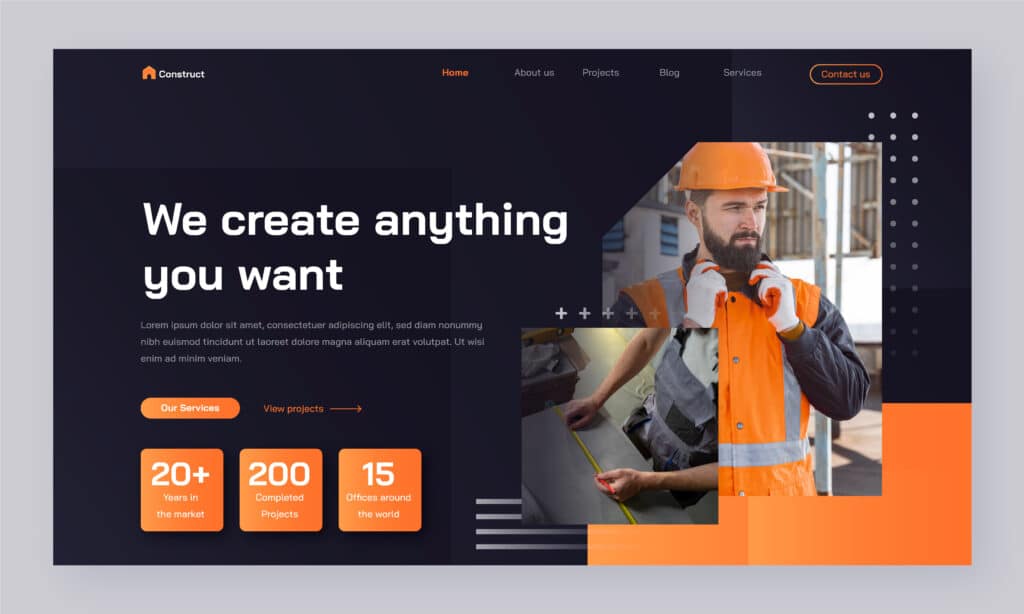In today’s competitive digital landscape, having a professional website is essential for any construction business. A construction website Design serves as your virtual storefront, showcasing your expertise, projects, and services to potential clients. Whether you’re a general contractor, a builder, or a construction firm, a well-designed website can help establish credibility, generate leads, and drive business growth.
This guide explores the key features and benefits of a professional construction website, the importance of SEO optimization, and how to create a website that stands out in a crowded marketplace.

Why Your Construction Business Needs a Website
1. Showcase Your Expertise
A construction website allows you to display your portfolio, completed projects, and client testimonials. It helps potential clients understand the quality of your work and your areas of expertise, whether it’s residential, commercial, or industrial construction.
2. Build Credibility
A professional website with clear branding, certifications, and licenses reassures visitors about your legitimacy. It positions your business as reliable and trustworthy in the construction industry.
3. Attract New Clients
With effective SEO strategies, your website can rank higher on search engines, making it easier for potential clients to find your services. This can significantly increase leads and conversions.
4. Stay Competitive
In the digital age, businesses without websites often miss out on opportunities. Having a modern, user-friendly website ensures you remain competitive in your market.
Key Features of a Construction Website Design
1. Responsive Design
Your website should look and function perfectly on all devices, including desktops, tablets, and smartphones. A responsive design ensures a seamless user experience, improving visitor engagement and reducing bounce rates.
2. Visually Appealing Layout
A clean and professional design is crucial. Use high-quality images, videos, and graphics to showcase your projects. Incorporate a consistent color palette and fonts that align with your brand.
3. Easy Navigation
Organize your content with a clear and intuitive navigation menu. Include pages for Home, About Us, Services, Portfolio, Testimonials, and Contact Us to guide visitors through your site effortlessly.
4. Portfolio Section
Highlight your expertise with a dedicated portfolio page. Include detailed project descriptions, high-resolution images, and client feedback to impress visitors.
5. Service Pages
Create individual pages for each service you offer, such as construction management, remodeling, or design-build services. Optimize these pages with relevant keywords to enhance search engine visibility.
6. Call-to-Action (CTA) Buttons
Strategically place CTA buttons like “Request a Quote,” “Contact Us,” or “View Portfolio” to encourage visitor interaction and drive conversions.
7. Blog Section
A blog is a great way to share valuable insights, tips, and industry updates. Regularly updating your blog with SEO-optimized content can help improve your website’s ranking and attract more visitors.
8. Contact Information
Make it easy for potential clients to reach you. Include your phone number, email address, and office location prominently on your website. Integrate a contact form for direct inquiries.
9. Integration with Social Media
Link your social media profiles to your website to enhance your online presence and allow visitors to explore more about your brand.
1. Conduct Keyword Research
Identify keywords related to your business, such as “construction services near me,” “commercial construction companies,” or “home remodeling experts.” Use tools like Google Keyword Planner to find relevant keywords with high search volume and low competition.
2. Optimize On-Page Content
Incorporate keywords naturally into your website’s content, including headings, meta descriptions, and image alt tags. Avoid keyword stuffing, as it can harm your rankings.
3. Focus on Local SEO
For construction businesses, local SEO is crucial. Optimize your website for location-based keywords and create a Google My Business profile to appear in local search results.
4. Use High-Quality Content
Publish well-written and informative content that addresses your audience’s needs. For example, write blog posts about “Tips for Choosing a Construction Contractor” or “Top Trends in Residential Construction.”
5. Improve Site Speed
A fast-loading website improves user experience and boosts SEO rankings. Use tools like Google PageSpeed Insights to identify and fix speed-related issues.
6. Build Backlinks
Earn backlinks from reputable websites in your industry to enhance your site’s authority and improve search engine rankings.
7. Ensure Mobile-Friendliness
Since many users search for services on mobile devices, ensure your site is mobile-friendly. Test your site on multiple devices to verify its performance.
8. Add Schema Markup
Use schema markup to provide search engines with detailed information about your business, such as your location, services, and reviews. This can enhance your search engine visibility.



